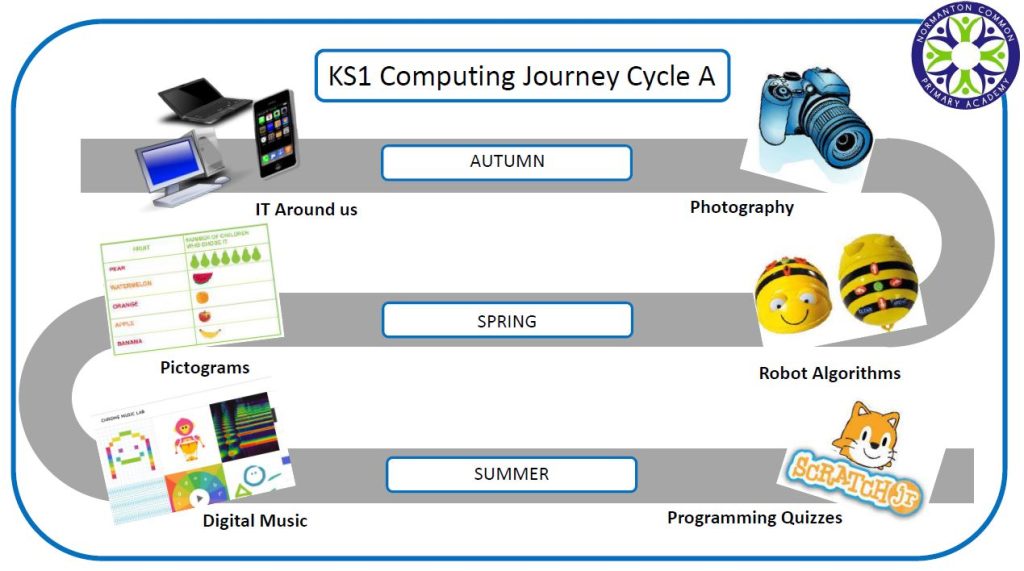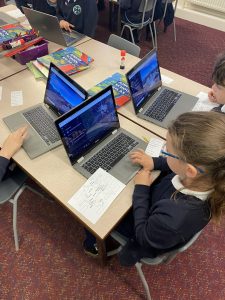Subject Leader : Nicola Corban
A high-quality computing education equips pupils to use computing thinking and creativity to understand and change the world. The core of computing is computer science, in which pupils are taught the principles of information and computation, how digital systems work and how to put this knowledge to use through programming. Building on this knowledge and understanding, pupils are equipped to use information technology to create programs, systems and a range of content. Computing also ensures that pupils become digitally literate, able to use, and express themselves and develop their ideas through, information and communication. As a school, we embrace the national vision for Computing and appreciate that, to achieve this, pupils must have access to a curriculum which is ‘balanced and broadly based’.
Our aim is to produce learners who are confident, discerning and effective users of technology and who also have a good understanding of computers and how computer systems work, and how they are designed and programmed.
In Computing pupils will have the opportunity to:
- Understand and apply the fundamental principles and concepts of computer science, including abstraction, logic, algorithms and data representation
- Analyse problems in computational terms, and have repeated practical experience of writing computer programs in order to solve such problems
- Evaluate and apply information technology, including new or unfamiliar technologies, analytically to solve problems
- Be responsible, competent, confident and creative users of information and communication technology.
In KS1 children will be taught to:
- understand what algorithms are; how they are implemented as programs on digital devices; and that programs execute by following precise and unambiguous instructions
- create and debug simple programs
- use logical reasoning to predict the behaviour of simple programs
- use technology purposefully to create, organise, store, manipulate and retrieve digital content
- recognise common uses of information technology beyond school
- use technology safely and respectfully, keeping personal information private; identify where to go for help and support when they have concerns about content or contact on the internet or other online technologies.
In KS2 children will be taught to:
- design, write and debug programs that accomplish specific goals, including controlling or simulating physical systems; solve problems by decomposing them into smaller parts
- use sequence, selection, and repetition in programs; work with variables and various forms of input and output
- use logical reasoning to explain how some simple algorithms work and to detect and correct errors in algorithms and programs
- understand computer networks including the internet; how they can provide multiple services, such as the world wide web; and the opportunities they offer for communication and collaboration
- use search technologies effectively, appreciate how results are selected and ranked, and be discerning in evaluating digital content
- select, use and combine a variety of software (including internet services) on a range of digital devices to design and create a range of programs, systems and content that accomplish given goals, including collecting, analysing, evaluating and presenting data and information
- use technology safely, respectfully and responsibly; recognise acceptable/unacceptable behaviour; identify a range of ways to report concerns about content and contact.
How is the content / theme chosen?
The content is chosen to make effective links with key themes and ensure coverage of the expectations as set out in the National Curriculum programmes of study, as well as the EYFS framework. At Normanton Common Primary Academy, we ensure a clear, sequenced progression, which is taught systematically for all pupils to acquire the intended knowledge and skills. The content may be adapted or changed, based upon the needs or interests of specific cohorts.
Click on the link below to see an overview of our Computing Curriculum:

How do we ensure progression of knowledge and skills?
At Normanton Common Primary Academy we have in place, for each subject area, a knowledge and skills progression document, which is used for planning, to ensure sequenced and appropriate content for specific year groups. Teachers are clear on the learning and expectations for each year group, as this has been carefully selected and mapped out so that children are building on prior knowledge and skills each term and each year. Within these documents there are opportunities for differentiation, in order to meet the needs of all learners.
How is the subject taught?
Computing lessons are carefully planned through our themes, so that valuable links can be made across other subjects. A two year, long term rolling programme maps out the coverage of the discrete teaching and learning opportunities for children to develop and embed specific skills. This ensures coverage of the National Curriculum, for science across Key Stage 1 and 2 and work within and beyond the Early Year’s Framework across our Foundation Stage. Within each discrete block of computing teaching, I carefully plan the specific outcomes for their year group, based upon age appropriate knowledge and skills, as well as the needs of the cohort or individuals within it.
There is a strong focus on developing the computing vocabulary of our children and retention of this through practical learning opportunities. New vocabulary is taught, with the emphasis on key computing words and phrases . Although we actively introduce and are ambitious with the language we use, we understand the importance not to over complicate this language with very young children, but ensure underlying principles and meanings of the words are taught and understood.
Children are introduced to and reminded of key vocabulary. Questioning is used to check their understanding and prior knowledge, before new concepts, skills or knowledge are introduced. Modelling is used to clarify expectations, children are then given plentiful opportunities to consolidate, build upon and apply basic skills and knowledge, across a series of lessons, as well as across the year. When children are learning about a subject through a discrete teaching session they are explicitly told that today they are going to be ‘Technologists.’ They are then reminded of the key skills that they will learn, use and develop within this subject.
In Computing these are:
- Understanding the world of technology around us.
- Creating media.
- Programming.
- Online Safety.
We are learning to
- Use basic computer skills.
- Programming toys (Bee-Bots Crumble’s and Mirco: Bit’s)
- Word processing.
- Online safety.
- Internet research.
- Creating a programme.
- Creating a presentation.
Through studying a range of people from the past and present, who have had an impact on the world of Computing and technology, as well as a range of countries and cultures, children learn about and are taught to challenge stereotypes connected to gender, wealth, disability and cultural background. They are educated that differences should be celebrated and are not a barrier to achievement. Pupils also have additional opportunities to extend their computing knowledge and skills through cross-curricular work. Strong links with other subject areas, particularly Maths and English, ensure that children have numerous opportunities to apply skills across the curriculum. Opportunities to learn about significant people, including inventors and explorers are carefully chosen, so that children are continually developing the sense of the importance of computing in the wider world. Through studying a range of people and places linked to computing and technology, children are taught to challenge stereotypes connected to gender, wealth, disability and cultural background and are educated that differences, including where you are born or live in the world, should be celebrated and are not a barrier to achievement.
Teaching Computing in EYFS
Planning and teaching in EYFS is similar to that in Key Stage 1. The children are expected to develop a specific set of skills and knowledge appropriate to their age. This is often beyond the expectations that are set out in the end of year Early Learning Goals, as we prepare our children with the knowledge and skills they will need in computing, ready for Year 1.
As well as topic work and the discrete teaching of skills and knowledge, children in EYFS are given the opportunity to explore, investigate, question and continually practise and embed their language and leaning through the areas of provision set up in the indoor and outdoor learning environments. This is through the Barefoot curriculum, which specialises in computing in the Early Years.
How do we know that our children are making progress?
Ongoing assessments of the children’s knowledge and skills is observed by the class teacher. Misconceptions are addressed and next steps carefully planned. Children’s outcomes are compared to the subject specific skills and knowledge documents. At the end of a block of discrete teaching (or term) subject leaders gather an overview of children’s outcomes in each subject area. This is used to plan appropriate next steps for their future learning, as well as provide an overview of learning within a subject area across the whole school. End of year assessments are collated for children at the end of EYFS and Key Stage 1.
How do we promote our Curriculum Intent?
Active Learners
Children are taught to become resilient and confident learners as there are always opportunities for children to ‘have a go.’ Learning a new skill is recapped in every lesson so the skills are becoming embedded into their learning. Once a skill has been taught the children have opportunities in the lesson to work on it. With this, children are becoming independent learners and are engaged into each and every lesson. This then in turn ensures that children have the ambition to move their learning forward.
Active Citizens
Within the Online safety topic children are guided on the best practise in using computers. They are shown how the misuse of computers can affect their health and well-being but also shows them how using computers can have a positive impact on their health and well-being. Within this they are taught how computing and our use of technology has an impact on our world.
Active Communicators
Within each and every computing session children are been introduced to a wide range of vocabulary depending on the topic been taught. This then ensure that the reading and the vocabulary they are been exposed to is age appropriate to them and relates to the chosen topic.
What wider opportunities are provided for our children?
Children at Normanton Common Primary Academy are encouraged to use other sources of technology throughout their lessons. For example, to use the iPads to complete research. In Maths lessons, children also have the opportunity to use the iPads or laptops to access TimesTables Rockstars, which is an online programme designed to boost children’s timestable knowledge.
Children also have their own email and password which are securely linked to their own class Teams account. Teams is used throughout school to display messages, set homework, upload completed homework or ask questions about any work they maybe unsure of.
Computing in action...

